
The 45th Annual Grammy Awards were held on February 23, 2003 at Madison Square Garden in New York City. Musicians accomplishments from the previous year were recognized. Norah Jones and her song "Don't Know Why" were the main recipients of the night, garnering six Grammys, including four major awards: Record of the Year, Album of the Year, Song of the Year and Best New Artist, plus Best Female Pop Vocal Performance and Best Pop Vocal Album.Songwriter Jesse Harris received the Song of the Year award for his work on "Don't Know Why." Simon and Garfunkel reunited to open the show performing "The Sound of Silence".

Sugar Hill Records is an American bluegrass and Americana record label.

Eagle When She Flies is the thirty-second solo studio album by Dolly Parton. It was released on March 7, 1991. Continuing the country sounds of 1989's White Limozeen, the album featured collaborations with Lorrie Morgan and Ricky Van Shelton; additional supporting vocals were provided by Vince Gill and Emmylou Harris. Dolly Parton's duet with Shelton, "Rockin' Years", topped the country charts, and the follow-up single co-written by Carl Perkins, "Silver and Gold", was a #15 country single. Rounding out the hit singles was the title song "Eagle When She Flies", which only reached a #33 peak, despite spending 20 weeks on the Billboard Country Singles chart. Her duet with Lorrie Morgan, "Best Woman Wins", appeared simultaneously on Lorrie Morgan's 1991 album Something in Red. She co-wrote the song "Family" with Carl Perkins and "Wildest Dreams" with Mac Davis. The album also topped the U.S. country albums charts, Parton's first solo album to reach the top in a decade and reached #24 on the pop albums charts. The album spent 73 weeks on the Billboard Top Country Albums chart. It was her first solo studio album to reach number one album in the United States after 1980's 9 to 5 and Odd Jobs.

The Mystery of Life is the 77th album by country singer Johnny Cash, released in 1991, and his last for Mercury Records. The songs featured are culled from both recent sessions and from leftovers from Cash's first Mercury session in 1986 for the album Johnny Cash is Coming to Town.
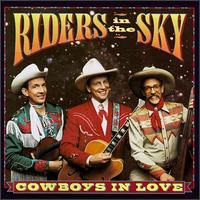
Cowboys in Love is a studio recording released by the Western band Riders in the Sky, released in 1994. It was their only release on the Epic label.

Cowboy Songs Four is the twenty-first album by American singer-songwriter Michael Martin Murphey, his fourth album of cowboy songs, and his first album produced by his son, Ryan Murphey. The album features a guest performance by Lyle Lovett on "Farther Down the Line".

The Horse Legends is the twentieth album by American singer-songwriter Michael Martin Murphey. This is Murphey's tribute to the horse and contains a duet with Johnny Cash on "Tennessee Stud", cover versions of Dan Fogelberg's "Run for the Roses" and Gordon Lightfoot's "The Pony Man", and re-recordings of Murphey's "Wildfire" and "The Running Blood". The Horse Legends was the last album Murphey recorded for Warner Bros. Records.

Sagebrush Symphony is the nineteenth album by American singer-songwriter Michael Martin Murphey, his second live album since his 1979 live/studio album Peaks,Valleys,Honkytonks and Alleys, and his first album with a symphony orchestra. Recorded live with the San Antonio Symphony Orchestra, this ambitious album, which presents cowboy songs and poems in a symphonic setting, contains a selection of Murphey's most popular songs, as well as traditional cowboy music. Murphey turns in "an impassioned performance" and the inclusion of guest artists Sons of the San Joaquin, Ric Orozco, Herb Jeffries, and Robert Mirabal "adds to the musical diversity and richness of the album."

Cowboy Songs III – Rhymes of the Renegades is the eighteenth album by American singer-songwriter Michael Martin Murphey and his third album of cowboy songs. The album is devoted to cowboy folklore and true tales of the West and focuses on real-life outlaws, from Jesse James to Billy The Kid to Belle Starr. Murphey performs these songs "with a scholar's eye and a fan's heart."
Doing My Best: Volume 1 is a contemporary Christian music album by Steve Camp and was released by Sparrow Records in 1990. This is the first of two compilation albums under this name. The album features songs from Camp's previous Sparrow releases, Fire and Ice, Shake Me to Wake Me, One on One, After God's Own Heart and Justice; as well as one new song and a remake of Run to the Battle.
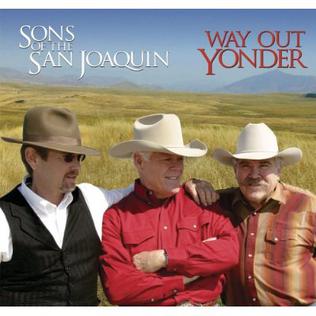
Way Out Yonder is the twelfth album released by the Sons of the San Joaquin. It was made available through their website in October 2005, and saw a worldwide release in January of the following year.
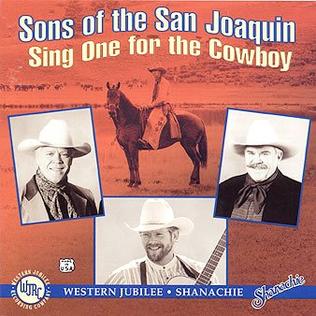
Sing One For the Cowboy is the ninth album released by the Sons of the San Joaquin.
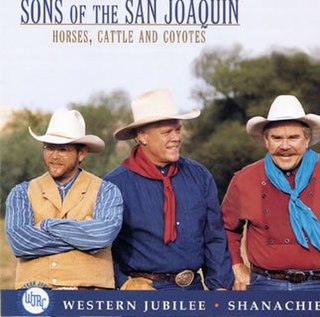
Horses, Cattle and Coyotes is the eighth album from the Sons of the San Joaquin.

Bound For the Rio Grande is the second Sons of the San Joaquin album. It was independently produced and distributed and contains songs written by or notably recorded by the Sons of the Pioneers.

Great American Cowboy is the first album by the Western music band Sons of the San Joaquin, released in 1990. It was independently produced and distributed and primarily contains songs written by or notably recorded by the Sons of the Pioneers. It was their first and only album to contain original material penned by member Jack Hannah until 1995's From Whence Came the Cowboy.

Gospel Trails is the sixth Sons of the San Joaquin album and the first distributed by Western Jubilee Recording Company/Shanachie.

15 Years: A Retrospective is the tenth Sons of the San Joaquin album. It contains three previously unreleased songs. According to the liner notes, the previously released material was "digitally re-mixed and re-mastered."
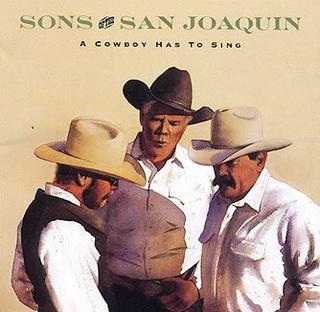
A Cowboy Has to Sing is the third Sons of the San Joaquin album and the first for a major label. All of the album's songs were written by members of the Sons of the Pioneers. Though newly recorded, the songs on this album can all be found on the two previous releases.
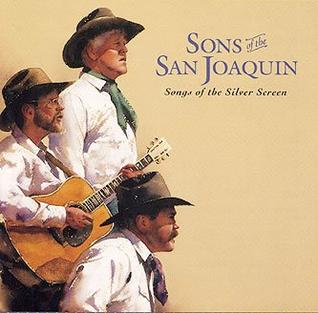
Songs of the Silver Screen is the fourth Sons of the San Joaquin album and the first for a major label. Like previous albums, all of the songs were written by or notably recorded by the Sons of the Pioneers. Unlike the previous release, only one song in this collection can be found on an earlier Sons of the San Joaquin album.
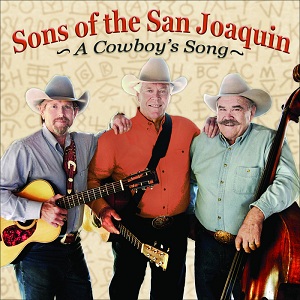
A Cowboy's Song is the fourteenth album released by the Sons of the San Joaquin.






















